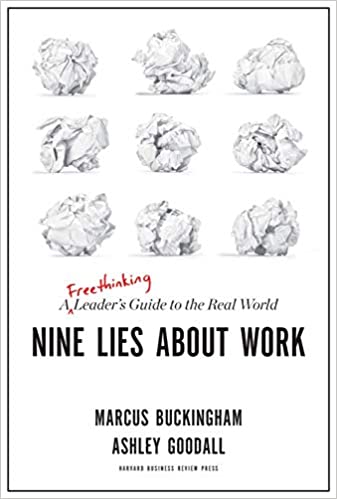This post is part of the 📖 Nine Lies About Work series.
Today, I am started reading the LIE #5: People need feedback chapter of book Nine Lies About Work written by Authors Marcus Buckingham & Ashley Goodall.
There are some big lies, distortions, faulty assumptions, wrong thinking that we encounter every time we show up for work. Nine lies, to be exact. They cause dysfunction and frustration, ultimately resulting in workplaces that are a pale shadow of what they could be.
By reading Nine Lies About Work, you can get past the lies and discover what’s real. These freethinking leaders recognize the power and beauty of our uniqueness. They know that emergent patterns are more valuable than received wisdom and that evidence is more powerful than dogma.
Yesterday, I finished reading LIE #4: The best people are well-rounded chapter from Nine Lies About Work book.
Chapter #5
LIE #5: People need feedback
To fix a performance problem, we instinctively turn to give you personal feedback rather than looking at the external situation you were facing and addressing that.
What’s attractive about Snapchat to millennials compared to Facebook is that they can go there, post there, and share there, all without feeling the pressure of feedback.
They see the size of their audience. They keep their snap streaks alive with their friends.
But they never have to worry about feedback at all: there is no judgment, let alone any permanent record of judgment. Instead, there is just the connection to a friend or an audience.
The truth is that people need attention—and when you give it to us in a safe and non-judgmental environment, we will come and stay and play and work.
People don’t need feedback. They need attention and attention to what they do the best. And they become more engaged and therefore more productive when we give it to them.
So far, so good. We like positive attention, and it helps us do better work. But what about learning? For that, you come back tomorrow to know the answers.
That’s it for today. Tomorrow, we will continue to read the same chapter LIE #5: People need feedback.
Key Takeaways
- Positive attention is thirty times more powerful than negative attention in creating a high-performance team.
LIE #1: People care which company they work for
We, as team members, want our team leader to make us feel part of something bigger, that he/she shows us how what we are doing together is important and meaningful. You as a team leader make us feel that you can see us, and connect to us, and care about us, and challenge us in a way that recognizes who we are as individuals.
LIE #2: The Best Plan Wins
It’s far better to coordinate your team’s efforts in real-time, relying heavily on each unique team member’s informed, detailed intelligence. You’ll have to sit down and survey your team members and make your plan.
The more frequently and predictably you check in with your people or meet with your team—the more you offer your real-time attention to the reality of their work—the more performance and engagement you will get.
It’s not true that the best plan wins. The best intelligence indeed wins.
LIE #3: The best companies cascade goals
We should unlock information through intelligence systems and cascade meaning through our expressed values, rituals, and stories.
We should let our people know what’s going on in the world and which hill we’re trying to take, and then we should trust them to figure out how to contribute.
They will invariably make better and more authentic decisions than those derived from any planning system that cascades goals from on high.
LIE #4: The best people are well-rounded
Best people are not well-rounded. They are distinctive. Well-roundedness is a misguided and futile objective for individual people, but it’s an absolute necessity for teams.
The well-rounded high performer is a creature of the theory world. However, each high performer is unique and distinct in the real world and excels precisely because that person has understood their uniqueness and cultivated it intelligently.
Competencies like Customer focus, innovation, growth orientation, agility are values to be shared, and they are not abilities to be measured.
Shift your thinking to outcomes where you’re asking individual team members to deliver to better match their distinctive talents.
Author(s): Marcus Buckingham
Author(s): Ashley Goodall
Part 11 of 23 in the 📖 Nine Lies About Work book series.
Series Start | Nine Lies About Work - Day 10 | Nine Lies About Work - Day 12
